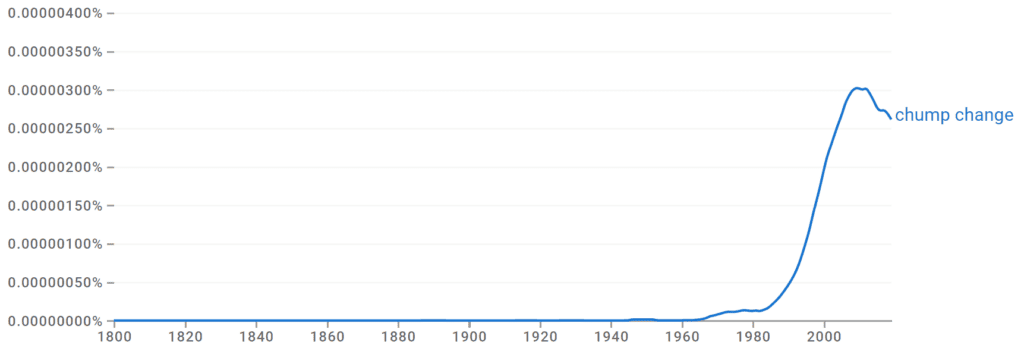What does chump change mean? Well, it’s not some special currency for chumps, if that’s what you’re thinking. This term is actually a popular idiom in the English language. So, stick with me, and let’s dive into the world of this funny-sounding phrase. I’ll be exploring its meaning and origins and showing you how to use it in everyday conversation.
Chump Change Meaning Explained

In the simplest of terms, chump change just refers to a small or insignificant amount of money. It’s the kind of money that’s not enough to buy you a yacht, but maybe just a gumball from the candy machine at the mall.
If someone refers to an amount of money as chump change, they’re saying it’s not really worth much or not enough to make any sort of significant difference. It’d be like if you needed $500 to pay a bill and someone offered you $5. It’s a nice gesture, but it’s chump change. What difference would that $5 really make to the issue at hand?
Chump Change Origin and Etymology

The phrase chump change is thought to have originated in the United States around the mid-20th century. The word “chump” in English slang means foolish or a person who’s easily deceived. Combine this with “change,” which usually means coins or small amounts of money, and you get an expression that describes a small, negligible sum of money or something a “chump” might be content with.
Synonyms for Chump Change
Looking for a little variety in your vocabulary? Here are some synonyms for chump change that still hold the same overall intent.
- Peanuts
- Chicken feed
- Pittance
- Small potatoes
- Drop in the bucket
- Nickel and dime
How to Use Chump Change: Examples in a Sentence

This list of full sentences has some great examples of how to use chump change in conversation and writing.
- For a billionaire like Elon Musk, a million dollars is practically chump change.
- They offered me what seemed like chump change for all the hard work I put into the month-long project.
- The cost of the repairs is chump change compared to the value of the vintage car.
- The cost of my morning Starbucks coffee is chump change compared to my monthly rent for downtown New York.
- Mary inherited a large fortune from her late uncle, making her salary look like chump change.
- Did he seriously think he could bribe me with that chump change? I’m worth more than that!
- I found a few coins in the couch cushions, but it’s just chump change, and we still need another $50.
- The pharmaceutical company was fined for their horrible negligence, but the penalties and fines are just chump change for them.
- Considering the overall cost of the renovation project, the price of the paint was just chump change.
Pay Up
That’s all there is to know about the term chump change. It’s a simple phrase that’s been used for decades, and anyone can use it. It’s not meant to be a negative or offensive statement unless you’re poking fun at the amount of money someone earns.
